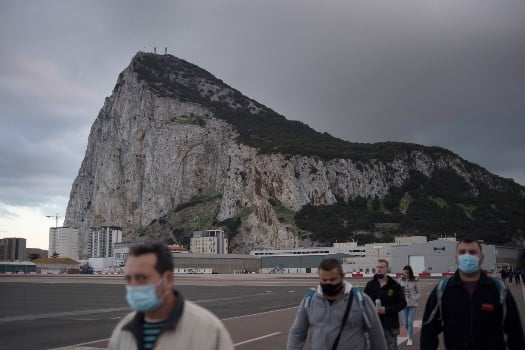But the easy flow of people across the border from Spain which underpins the economy of this tiny British territory on the southern tip of the Iberian Peninsula risks ending when Britain leaves the European Union's single market on December 31st.
Along Gibraltar's pedestrianised Main Street whose buildings feature decorative Portuguese tiles, Genoese shutters and British wrought-iron balconies, shopkeepers worry business will be hurt by tighter controls at what will be a new border between Britain and the EU.
“It is going to put people off visiting Gibraltar I think,” said 41-year-old Prem Mahtani at his jewellery shop on Main Street, one of four tourism-dependent stores run by his family in the enclave.
Along with gambling and offshore banking, tourism is a cornerstone of the economy for Gibraltar, one of the most prosperous regions in Europe which is home to 34,000 people and is historically claimed by Spain.
Located at the mouth of the Mediterranean, the British enclave welcomes around 10 million visitors per year, mainly day-trippers who cross from Spain under the shadow of the Rock of Gibraltar, a massive limestone block whose white cliffs soar more than 400 metres (1,300 feet) above the sea.
In addition, some 15,000 people cross into Gibraltar every day to work, accounting for half of the territory's workforce.
While most are Spanish, this labour force includes dozens of other nationalities, including about 2,500 Britons who live in Spain where housing is cheaper than in Gibraltar.
With a land area of just 6.8-square kilometres (2.6-square miles), Gibraltar imports all of its food, which will take longer if administrative checks are increased at the border.
A desire to keep things flowing smoothly at the border explains why in 2016 nearly 96 percent of voters in Gibraltar backed staying in the EU, while in Britain proper the referendum vote was 52-48 percent in favour of leaving the bloc.
Reduced influence
Speaking to AFP, Gibraltar's Chief Minister Fabian Picardo (pictured below) said his government was seeking a deal with Spain which would maintain the “maximum possible level of fluidity” at the frontier, and was working with suppliers to ensure goods crossed in easily to avoid “economic collapse”.

While reaching an agreement is “not easy”, it is still within reach, Picardo said, without giving details of the talks.
In the event there is no deal, Gibraltar has extended its port facilities to be able to handle more ships carrying goods.
While Spain ceded Gibraltar to Britain in perpetuity in 1713 following a military struggle, Madrid has long wanted it back in a thorny dispute that has for decades involved pressure on the frontier.
Tensions peaked in 1969 when the regime of dictator Francisco Franco closed the border, which did not fully reopen until 1985.
In 2013, a dispute over an artificial reef in waters claimed by both sides sparked a war of words that triggered months of gridlock at the border after Spain intensified checks, which only ended when Brussels stepped in.
But with Britain out of the EU, its ability to persuade Spain “not to put pressure on Gibraltar, to not have border closures, will all be reduced,” said Quentin Peel, an associate fellow at London's Chatham House think tank.

'Who we are'
For now, Spain's leftist government has agreed to put the issue of its sovereignty claim to one side to focus on keeping the border with Gibraltar open.
Madrid has in the past called for shared sovereignty with Britain over the territory, a proposal rejected by 99 percent of Gibraltarians in a 2002 referendum.
But if there are bottlenecks at the border, the people of Gibraltar could “in the medium and long-term” be persuaded that shared sovereignty would be better for them, said Ignacio Molina, an analyst at the Elcano Royal Institute think-tank in Madrid.
“If there was a good deal that allows them to have self-government and keep a British military base there, that could convince them and overcome the great suspicion they have about Spain,” he told AFP.
Picardo, however, said Spain could do nothing that would “change our minds about our desire to remain wholly and entirely British”.
“Being British is what we are, it is what we have in our veins,” he added. “It's our culture, it's our education, it's our way of life.”
By AFP's Daniel Silva



 Please whitelist us to continue reading.
Please whitelist us to continue reading.
Member comments